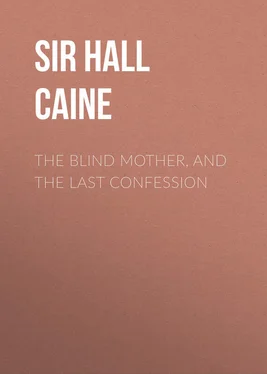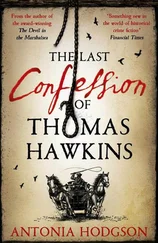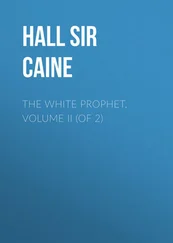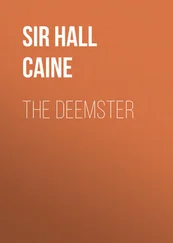Hall Caine - The Blind Mother, and The Last Confession
Здесь есть возможность читать онлайн «Hall Caine - The Blind Mother, and The Last Confession» — ознакомительный отрывок электронной книги совершенно бесплатно, а после прочтения отрывка купить полную версию. В некоторых случаях можно слушать аудио, скачать через торрент в формате fb2 и присутствует краткое содержание. ISBN: , Жанр: foreign_antique, foreign_prose, на английском языке. Описание произведения, (предисловие) а так же отзывы посетителей доступны на портале библиотеки ЛибКат.
- Название:The Blind Mother, and The Last Confession
- Автор:
- Жанр:
- Год:неизвестен
- ISBN:http://www.gutenberg.org/ebooks/35140
- Рейтинг книги:5 / 5. Голосов: 1
-
Избранное:Добавить в избранное
- Отзывы:
-
Ваша оценка:
- 100
- 1
- 2
- 3
- 4
- 5
The Blind Mother, and The Last Confession: краткое содержание, описание и аннотация
Предлагаем к чтению аннотацию, описание, краткое содержание или предисловие (зависит от того, что написал сам автор книги «The Blind Mother, and The Last Confession»). Если вы не нашли необходимую информацию о книге — напишите в комментариях, мы постараемся отыскать её.
The Blind Mother, and The Last Confession — читать онлайн ознакомительный отрывок
Ниже представлен текст книги, разбитый по страницам. Система сохранения места последней прочитанной страницы, позволяет с удобством читать онлайн бесплатно книгу «The Blind Mother, and The Last Confession», без необходимости каждый раз заново искать на чём Вы остановились. Поставьте закладку, и сможете в любой момент перейти на страницу, на которой закончили чтение.
Интервал:
Закладка:
The Blind Mother, and The Last Confession
THE BLIND MOTHER
I
The Vale of Newlands lay green in the morning sunlight; the river that ran through its lowest bed sparkled with purple and amber; the leaves prattled low in the light breeze that soughed through the rushes and the long grass; the hills rose sheer and white to the smooth blue lake of the sky, where only one fleecy cloud floated languidly across from peak to peak. Out of unseen places came the bleating of sheep and the rumble of distant cataracts, and above the dull thud of tumbling waters far away was the thin caroling of birds overhead.
But the air was alive with yet sweeter sounds. On the breast of the fell that lies over against Cat Bell a procession of children walked, and sang, and chattered, and laughed. It was St. Peter's Day, and they were rush-bearing; little ones of all ages, from the comely girl of fourteen, just ripening into maidenhood, who walked last, to the sweet boy of four in the pinafore braided with epaulets, who strode along gallantly in front. Most of the little hands carried rushes, but some were filled with ferns, and mosses, and flowers. They had assembled at the schoolhouse, and now, on their way to the church, they were making the circuit of the dale.
They passed over the road that crosses the river at the head of Newlands, and turned down into the path that follows the bed of the valley. At that angle there stands a little group of cottages deliciously cool in their whitewash, nestling together under the heavy purple crag from which the waters of a ghyll fall into a deep basin that reaches to their walls. The last of the group is a cottage with its end to the road, and its open porch facing a garden shaped like a wedge. As the children passed this house an old man, gray and thin and much bent, stood by the gate, leaning on a staff. A collie, with the sheep's dog wooden bar suspended from its shaggy neck, lay at his feet. The hum of voices brought a young woman into the porch. She was bareheaded and wore a light print gown. Her face was pale and marked with lines. She walked cautiously, stretching one hand before her with an uncertain motion, and grasping a trailing tendril of honeysuckle that swept downward from the roof. Her eyes, which were partly inclined upward and partly turned toward the procession, had a vague light in their bleached pupils. She was blind. At her side, and tugging at her other hand, was a child of a year and a half – a chubby, sunny little fellow with ruddy cheeks, blue eyes, and fair curly hair. Prattling, laughing, singing snatches, and waving their rushes and ferns above their happy, thoughtless heads, the children rattled past. When they were gone the air was empty, as it is when the lark stops in its song.
After the procession of children had passed the little cottage at the angle of the roads, the old man who leaned on his staff at the gate turned about and stepped to the porch.
"Did the boy see them? – did he see the children?" said the young woman who held the child by the hand.
"I mak' na doot," said the old man.
He stooped to the little one and held out one long withered finger. The soft baby hand closed on it instantly.
"Did he laugh? I thought he laughed," said the young woman.
A bright smile played on her lips.
"Maybe so, lass."
"Ralphie has never seen the children before, father. Didn't he look frightened – just a little bit frightened – at first, you know? I thought he crept behind my gown."
"Maybe, maybe."
The little one had dropped the hand of his young mother, and, still holding the bony finger of his grandfather, he toddled beside him into the house.
Very cool and sweet was the kitchen, with white-washed walls and hard earthen floor. A table and a settle stood by the window, and a dresser that was an armory of bright pewter dishes, trenchers, and piggins, crossed the opposite wall.
"Nay, but sista here, laal lad," said the old man, and he dived into a great pocket at his side.
"Have you brought it? Is it the kitten? Oh, dear, let the boy see it!"
A kitten came out of the old man's pocket, and was set down on the rug at the hearth. The timid creature sat dazed, then raised itself on its hind legs and mewed.
"Where's Ralphie? Is he watching it, father? What is he doing?"
The little one had dropped on hands and knees before the kitten, and was gazing up into its face.
The mother leaned over him with a face that would have beamed with sunshine if the sun of sight had not been missing.
"Is he looking? Doesn't he want to coddle it?"
The little chap had pushed his nose close to the nose of the kitten, and was prattling to it in various inarticulate noises.
"Boo – loo – lal-la – mama."
"Isn't he a darling, father?"
"It's a winsome wee thing," said the old man, still standing, with drooping head, over the group on the hearth.
The mother's face saddened, and she turned away. Then from the opposite side of the kitchen, where she was making pretense to take plates from a plate-rack, there came the sound of suppressed weeping. The old man's eyes followed her.
"Nay, lass; let's have a sup of broth," he said, in a tone that carried another message.
The young woman put plates and a bowl of broth on the table.
"To think that I can never see my own child, and everybody else can see him!" she said, and then there was another bout of tears.
The charcoal-burner supped at his broth in silence. A glistening bead rolled slowly down his wizened cheek: and the interview on the hearth went on without interruption:
"Mew – mew – mew. Boo – loo – lal-la – mama."
The child made efforts to drag himself to his feet by laying hold of the old man's trousers.
"Nay, laddie," said the old man, "mind my claes – they'll dirty thy bran-new brat for thee."
"Is he growing, father?" said the girl.
"Growing? – amain."
"And his eyes – are they changing color? – going brown? Children's eyes do, you know."
"Maybe – I'll not be for saying nay."
"Is he – is he very like me, father?"
"Nay – well – nay – I's fancying I see summat of the stranger in the laal chap at whiles."
The young mother turned her head aside.
The old man's name was Matthew Fisher; but the folks of the countryside called him Laird Fisher. This dubious dignity came of the circumstance that he had been the holder of an absolute royalty in a few acres of land under Hindscarth. The royalty had been many generations in his family. His grandfather had set store by it. When the Lord of the Manor had worked the copper pits at the foot of the Eal Crags, he had tried to possess himself of the royalties of the Fishers. But the present families resisted the aristocrat. Luke Fisher believed there was a fortune under his feet, and he meant to try his luck on his holding some day. That day never came. His son, Mark Fisher, carried on the tradition, but made no effort to unearth the fortune. They were a cool, silent, slow, and stubborn race. Matthew Fisher followed his father and his grandfather, and inherited the family pride. All these years the tenders of the Lord of the Manor were ignored, and the Fishers enjoyed their title of courtesy or badinage. Matthew married, and had one daughter called Mercy. He farmed his few acres with poor results. The ground was good enough, but Matthew was living under the shadow of the family tradition. One day – it was Sunday morning, and the sun shone brightly – he was rambling by the Po Bett that rises on Hindscarth, and passed through his land, when his eyes glanced over a glittering stone that lay among the pebbles at the bottom of the stream. It was ore, good full ore, and on the very surface. Then the Laird sank a shaft, and all his earnings with it, in an attempt to procure iron or copper. The dalespeople derided him, but he held silently on his way.
Читать дальшеИнтервал:
Закладка:
Похожие книги на «The Blind Mother, and The Last Confession»
Представляем Вашему вниманию похожие книги на «The Blind Mother, and The Last Confession» списком для выбора. Мы отобрали схожую по названию и смыслу литературу в надежде предоставить читателям больше вариантов отыскать новые, интересные, ещё непрочитанные произведения.
Обсуждение, отзывы о книге «The Blind Mother, and The Last Confession» и просто собственные мнения читателей. Оставьте ваши комментарии, напишите, что Вы думаете о произведении, его смысле или главных героях. Укажите что конкретно понравилось, а что нет, и почему Вы так считаете.












